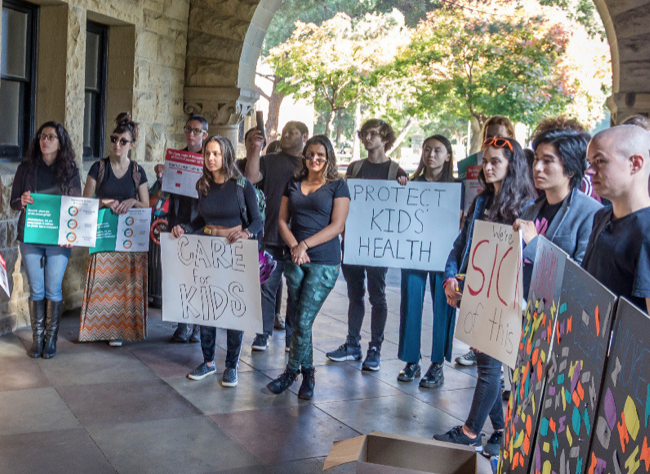You have /5 articles left.
Sign up for a free account or log in.

Graduate students and allies protest against rising dependent health-care costs.
'American Political Science Review'
Graduate students at Stanford University are balking at rising costs of health care to cover their dependents. Even graduate students without dependents object to the increases, saying they’re one more barrier to having a career in academe and a family, especially for women.
Stanford’s graduate assistant monthly premiums have risen some 80 percent over the past six years, from $496 for a spouse and two kids in 2014 to $893 this year. For someone working on a 25 percent appointment who gets the minimum stipend of $946 per pay period, that eats up nearly half a month’s income. A research or teaching assistant working on a 50 percent appointment makes more, at least $1,892 per biweekly pay period. But for a family of four in that scenario, health-care premiums -- not to mention copay and other costs associated with actually using that insurance -- are still about one-quarter of monthly income. Stanford, of course, also sits in one of the most expensive housing markets in in the country.
Students have been trying to bring attention to the issue for many months, on campus and off. But recent weeks have seen a flurry of activity, including on-campus demonstrations, a petition with 1,200 student and faculty names, and news and opinion pieces. Some graduate assistants have come forward to share their own personal experiences surrounding health care at Stanford. They’ve also set up a GoFundMe page to try to raise an emergency fund for their colleagues’ children and, if possible, to create an endowment for dependent health care. The goal is $200,000, or what students pay each month in premiums for their dependents, according to organizers.
“For the past two years, Stanford’s student health insurance administrators have threatened to cut the dependent healthcare program entirely, citing rising insurance costs,” reads the GoFundMe page. “Administration officials claim costs are rising because enrollment is decreasing, but by increasing costs without increasing stipends, they are pushing families off the plan and creating what the insurance industry calls a ‘death spiral.’”
Stanford said this week that it has no plans to eliminate dependent health-care coverage, but that health-care costs have been increasing nationwide, not just at Stanford. That’s of course true: individual premiums on Healthcare.gov increased 105 percent nationwide between 2013 and 2017 alone, to $5,712 annually. But Stanford students contend that their university, with its $27.7 billion endowment, is in the position do something about the problem.
“The university has been in discussions with concerned graduate students for the past two years about how best to support them and their families and these discussions are ongoing,” it said in a statement. “Vice Provost for Student Affairs Susie Brubaker-Cole and Vice Provost for Graduate Education Stacey Bent have met twice during fall quarter with graduate students, and will continue to do so.”
Stanford’s student dependent plan is administered by Health Net of California. While most institutions require that students are insured, coverage for spouses and children, where available, is considered optional. And it’s typically expensive, relative to students’ stipend amounts.
Justine Modica, a Ph.D. candidate in history who is concerned about both the short- and long-term implications of the premiums for academics, said of the GoFundMe page, “We don't think we should have to do this at an institution with Stanford's resources.” Activists have asked the university to guarantee free health care to graduate students’ children and for graduate students’ spouses who are unable to work in the U.S. and receive health care through their own employers.
Modica doesn’t have a child, but she said she worries about gender equity in academe, in that women “are typically in graduate school during their healthiest childbearing years and simply cannot delay the possibility of having children until after they complete their education.”
These issues affect men, as well, of course, she said, but by “failing to provide affordable” health care and, relatedly, childcare for graduate students' children, Stanford is “inadvertently reinforcing the structural barriers to women's advancement in the academy.”
Modica said the issue affects non-U.S. citizens in particular, in that these students may be concerned about exploring other, public alternative plans for their children, for fear of becoming a “public charge” under the Trump administration.
In an op-ed in The Stanford Daily, medical students Soleil Shah and Bianca Mulaney wrote that for potential graduate students, “high healthcare costs for dependents could make Stanford a less attractive option when choosing amongst graduate programs.” And international students, who are 34 percent of graduate students, “may prioritize healthcare offerings even more.”
Does Stanford “really want to dissuade these students from being part of our community, on top of bearing the repercussions of bad press?” Shah and Mulaney asked.
Moreover, they said, “How is a Ph.D. student supposed to focus on her thesis if she is too concerned about how she will pay for her son’s insulin medication or his upcoming surgery -- one that could make the difference between life or death?”
Irán Román, a Ph.D. candidate in computer research in music and acoustics, is among those who have shared personal struggles with Stanford’s dependent health-care plan, calling it “dysfunctional” and dangerous. He insures his wife and young son at $700 per month. In October, he said in a written testimonial, his wife, who was pregnant, needed an emergency ultrasound. But the lab could not corroborate his coverage and said the service alone would cost $2,000.
“We felt confused and frustrated, and seeing no better alternative, we flew the entire family to Mexico four days later to get the healthcare we needed,” he wrote. “An hour after we landed in Mexico we had the ultrasound, and we learned that the bleeding was caused due to a dead egg. We went through a miscarriage the following two weeks, involving several rounds of medication, surgical procedures, and antibiotics.”
He continued, “We felt devastated, not just due to the miscarriage, but also because Stanford failed us, once again.”
The university said that to reduce health-care costs for students, it created a need-based Family Grant program in 2018. The program provides up to $10,000 per year in help for a graduate student with dependent children.
“Funds may be used flexibly to cover expenses such as childcare, healthcare and rent,” Stanford said. “In addition, the university provided a substantial subsidy to keep dependent health insurance premiums flat for 2018-19 and to minimize the increase for 2019-20.”
Fait Poms, a Ph.D. candidate in computer science who doesn’t have any children, said she signed the petition against rising dependent care premiums because she wants her peer group to be diverse -- including parents.
It’s “important that graduate students can come from any background, not just those who have the luxury of being single, previously wealthy, spouseless and childless,” she said. “Providing free dependent health care for these students acknowledges the extra burden they have as an underrepresented group in graduate school.”





